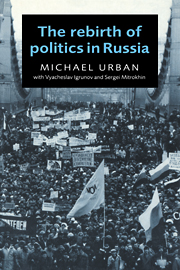Book contents
- Frontmatter
- Contents
- Preface
- Part I The pre-political context
- 1 Politics and communism: figure and ground
- 2 Regime and opposition in the pre-political period
- Part II Perestroika and the return of political life
- Part III Politics and revolution
- Part IV Ground up: politics in post-communist Russia
- Notes
- Index
1 - Politics and communism: figure and ground
Published online by Cambridge University Press: 22 October 2009
- Frontmatter
- Contents
- Preface
- Part I The pre-political context
- 1 Politics and communism: figure and ground
- 2 Regime and opposition in the pre-political period
- Part II Perestroika and the return of political life
- Part III Politics and revolution
- Part IV Ground up: politics in post-communist Russia
- Notes
- Index
Summary
The rebirth of politics in Russia is historically coextensive with the collapse of Soviet communism. More than mere contingency informs this temporal relationship. The key terms in it – politics and communism – define one another, like figure and ground, thesis and antithesis. On one hand, communism had represented a double-excision of politics: suppression of political activity, plus compulsory participation in ubiquitous pseudo-political rituals sponsored by the party-state. Here, we have in mind not only the repressive functions performed by the secret police, informers, prisons and labour camps, but also the appropriation of political forms for the purpose of preventing political practice, such as the empanelling of millions of individuals on Soviets by means of single-candidate ‘elections’ who would represent their constituents by unanimously endorsing whatever measures the authorities had placed before them. On the other, the return of political life in Russia would witness a double-relationship to communism. Politics would be reborn as a struggle against the communist system that had denied it. It would reappear as heroic action, challenging, resisting and defying the communist system in the name of human dignity, national restoration, freedom and democracy. Measured against standards such as these, the prosaic aspects of political activity – ambition, advantage, influence and so on – would seem so many miscreants subverting this struggle from within. But the institutional inheritance bequeathed by communism to the new Russian polity would complicate the matter of rebirth in far more profound and ramified ways.
- Type
- Chapter
- Information
- The Rebirth of Politics in Russia , pp. 3 - 27Publisher: Cambridge University PressPrint publication year: 1997



